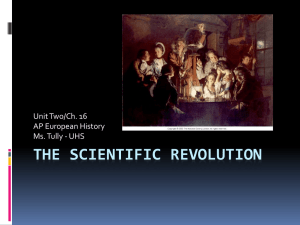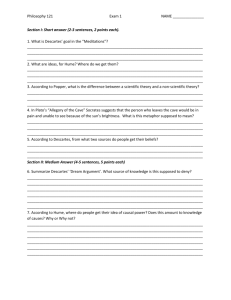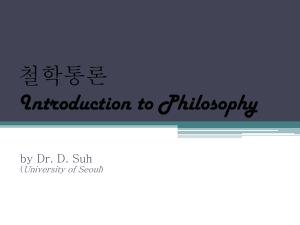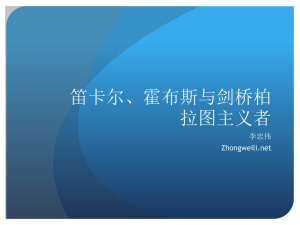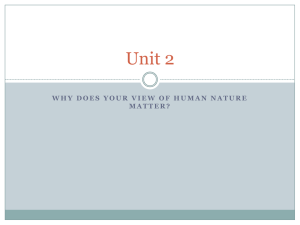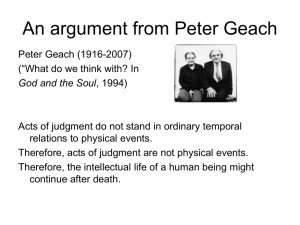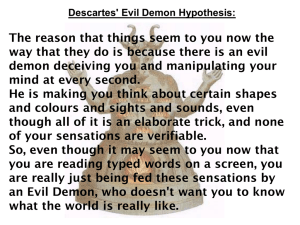Descartes-ProblemOfError
advertisement
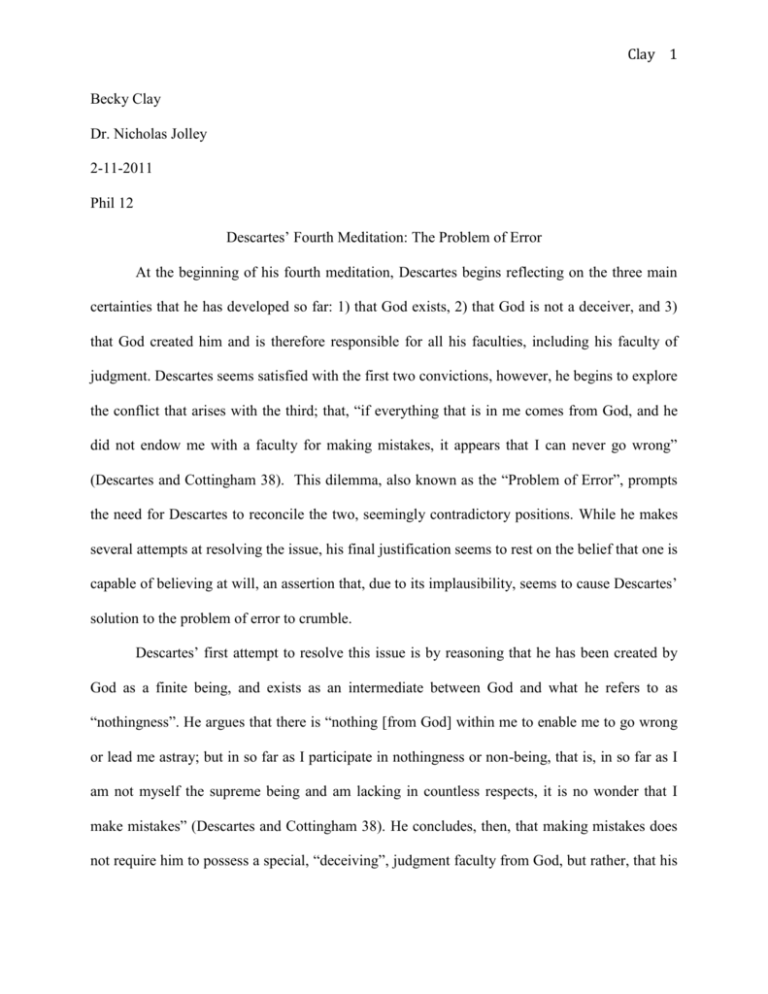
Clay 1 Becky Clay Dr. Nicholas Jolley 2-11-2011 Phil 12 Descartes’ Fourth Meditation: The Problem of Error At the beginning of his fourth meditation, Descartes begins reflecting on the three main certainties that he has developed so far: 1) that God exists, 2) that God is not a deceiver, and 3) that God created him and is therefore responsible for all his faculties, including his faculty of judgment. Descartes seems satisfied with the first two convictions, however, he begins to explore the conflict that arises with the third; that, “if everything that is in me comes from God, and he did not endow me with a faculty for making mistakes, it appears that I can never go wrong” (Descartes and Cottingham 38). This dilemma, also known as the “Problem of Error”, prompts the need for Descartes to reconcile the two, seemingly contradictory positions. While he makes several attempts at resolving the issue, his final justification seems to rest on the belief that one is capable of believing at will, an assertion that, due to its implausibility, seems to cause Descartes’ solution to the problem of error to crumble. Descartes’ first attempt to resolve this issue is by reasoning that he has been created by God as a finite being, and exists as an intermediate between God and what he refers to as “nothingness”. He argues that there is “nothing [from God] within me to enable me to go wrong or lead me astray; but in so far as I participate in nothingness or non-being, that is, in so far as I am not myself the supreme being and am lacking in countless respects, it is no wonder that I make mistakes” (Descartes and Cottingham 38). He concludes, then, that making mistakes does not require him to possess a special, “deceiving”, judgment faculty from God, but rather, that his Clay 2 ability to error is the result of his finitude, of God creating him as a finite, rather than infinite, being. In short, Descartes seems to believe that it is his finite nature that opens him up to error, but that opens the question of whether God could then be blameworthy for his finite nature. Descartes then begins to ponder why God, being the benevolent God that he is, did not will for him not to error. For this, he provides two main arguments: 1) the reason for God’s creations is incomprehensible, and 2) the perfection of God’s creations can be found when observing the universe as a whole, not by examining just one created thing on its own. Descartes believes that the reason for God’s creations is incomprehensible because he regards God to be infinite in knowledge and judgment, and so it is no surprise that he, a finite creation, would not be able to grasp certain things that were made by God. He writes, “For since I know that my own nature is very weak and limited, whereas the nature of God is immense, incomprehensible and infinite, I also know without more ado that he is capable of countless things whose causes are beyond my knowledge” (Descartes and Cottingham 39). Descartes believes that it is his limited knowledge that prevents him from understanding why God created him the ability to make mistakes. In his second argument, Descartes reasons that he must not complain about the lack of judgment that he has, because, due to his finitude, he is unable to comprehend God’s larger creation. He writes, “for what would perhaps rightly appear very imperfect if it existed on its own is quite perfect when its function as part of the universe is considered” (Descartes and Cottingham 39). After examining these two possibilities for why God did not create him with the faculty to never error, Descartes begins to investigate what the very source of such errors could be. He Clay 3 ultimately identifies two concurrent contributors: 1) the faculty of knowledge that is in him (intellect), and 2) the faculty of choice or freedom that is in him (will). The intellect, Descartes determines, is the limited scope of knowledge he has, whose role is to perceive and present ideas to the will that are subject for possible judgment. The will, on the other hand, is the faculty responsible for affirming or denying something that the intellect puts forward. Descartes believes that the scope of the intellect is limited, and that the scope of the will is boundless, parameters that allow his will to make judgments on ideas that are not “clearly and distinctly” understood by the intellect, and in turn, allows him to make mistakes. Descartes writes, “the scope of the will is wider than that of the intellect; but instead of restricting it within the same limits, I extend its use to matters which I do not understand. Since the will is indifferent in such cases, it easily turns aside from what is true and good, and this is the source of my error and sin” (Descartes and Cottingham 40). In other words, a correct use of will, according to Descartes, is when it is used within its intended limits. By holding this position, Descartes is able to maintain that it is not the faculties from God that are responsible for his making mistakes, but rather, the misuse of such faculties. While such an argument may seem convincing at first, there is an underlying issue of whether one is truly capable of believing at will. That is, is it ever possible for one to sincerely believe in something, just because they will to? According to Descartes will versus intellect argument, he seems to be asserting that the intellect puts forward propositions, and one’s will can choose to either believe them to be true or believe them to be false. But such an assertion does not seem plausible. For example, if a husband were to cheat on his wife, and the wife was presented with irrefutable evidence of his cheating, it seems incorrect to say that she “doesn’t believe” him to be cheating. While it is quite possible that she may not change her behavior in Clay 4 light of such knowledge (for example, file for divorce, confront her husband, etc.) that does not imply that the wife actually “believes” that her husband is not cheating. If one were able to will their beliefs, then it seems that one’s beliefs would be irrespective of truth, and therefore, unrepresentative of the reality in which we live. Additionally, even if one were to grant Descartes’ implied “believing at will” theory, it then seems that the next predicament would be to determine what exactly the intellect is able to “clearly and distinctly” perceive. For example, Descartes states that clear and distinct perceptions are those that are irrefutable by the will, That is, they are so clearly and distinctly perceived that the will cannot help but to affirm them. However, the problem arises in determining whether an inability to deny a clear and distinct perception makes it in fact a clear and distinct perception, or rather, a misuse of one’s will. It is for these reasons that Descartes’ attempt to resolve the problem of error seems to fail. If believing at will is what is needed to make Descartes’ argument work, then it undoubtedly becomes a weak one, due to the fact that one’s beliefs would then be irrespective of truth, even when there is mounting evidence supporting one way or another. Additionally, even if one were to grant Descartes’ theory of believing at will, it would then still be unclear as how one is able to determine “clear and distinct” perceptions from a misuse of one’s will. In conclusion, while Descartes’ arguments may appear convincing on the surface, upon deeper investigation there seems to be some incoherency and unclear details, which unfortunately, leave Descartes’ solution to the problem of error unsolved. Clay 5 Works Cited Descartes, René, John Cottingham, and Bernard Arthur Owen. Williams. Meditations on First Philosophy: With Selections from the Objections and Replies. New York: Cambridge UP, 1996. Print.



